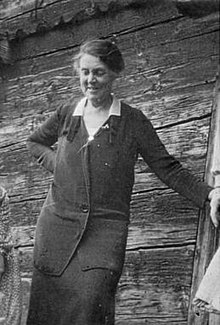Helen Storrow
| Helen Storrow | |
|---|---|
 |
|
| Born |
Helen Osborne September 22, 1864 Auburn, New York |
| Died | November 12, 1944 Doctor's Hospital, New York City, New York |
| Known for | Girl Scouting |
| Spouse(s) | James Jackson Storrow (1864-1926) |
| Children | James Jackson Storrow, Jr. (1892-1977) |
| Parent(s) | David Munson Osborne (1822-1886) and Eliza Wright (1830-1911) |
Helen Osborne Storrow (September 22, 1864 – November 12, 1944) was a prominent American philanthropist, early Girl Scout leader, and chair of the World Committee of the World Association of Girl Guides and Girl Scouts (WAGGGS) for eight years. She founded the First National Girl Scout Leaders' Training in Long Pond, Massachusetts; headed the leaders' training camp at Foxlease, UK; and donated the first of the WAGGGS World centres, Our Chalet.
She was married to James J. Storrow, a prominent banker, who was the second national president of the Boy Scouts of America.
Born Helen Osborne on September 22, 1864 in Auburn, New York, she was the youngest of David Munson (“Munson”) Osborne and Eliza Wright's four children. Her parents were raised in modest circumstances, but by the time of Helen's birth, Munson Osborne had become one of the most prominent men in Cayuga County. Helen and her siblings enjoyed a happy and privileged upbringing, attending private schools, traveling through Europe, and spending summers at their home on Owasco Lake at Willow Point, New York. The Osborne mansion at 99 South Street served as a cultural center in Auburn.
Her eldest sister, Emily (1854–1944), married Springfield banker Frederick Harris; her next eldest sister, Florence (1856–1877), was described as a gentle girl, extremely fond of animals, who died of typhoid fever, leaving behind a fiancée, Samuel Bowles; her only brother, Thomas Mott Osborne (1859–1926), inherited his father’s business, and became a stalwart advocate of prison reform.
Their father, Munson Osborne, was a farmer’s son from Rye, New York. His ancestors were once prosperous landowners, but they became impoverished, having lost their fortune in the aftermath of the American Revolution. Osborne left his father’s home at the age of fifteen, accepting work wherever it could be found. After several failed business ventures, Osborne founded D. M. Osborne & Co. in 1856, and made a fortune manufacturing agricultural machinery. Osborne’s life revolved around his work. He was an exacting, but fair employer, and years after his death his former employees still spoke of him with admiration. One of Auburn’s most respected citizens, Osborne served three terms as mayor (1877–1880); a position later held by both his son and one of his grandsons.
...
Wikipedia
